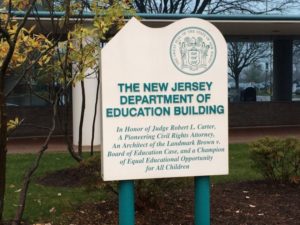When is a bill not just a bill?
When it’s A 3582, which directs that the NJ Education Commissioner “shall not approve an application for the establishment of a charter school unless…[it]…has been approved by the voters of district at the annual school election…”
Over the last few months A 3582 has become a lightning rod for education reform in the Garden State, an emblem of the political realignment engendered by issues like charter schools, vouchers, merit pay, and tenure reform.
A 3582 comes up Thursday before the Senate Education Committee and political factions are positioning themselves loudly, even though Gov. Christie will veto it if it passes. And with good reason: it’s a bill designed to quash charter school expansion in leafy suburbia, with the consequences of quashing school choice across the state. So why all the energy expended on a bad bill that will never become law?
First, a quick review of some of the hoopla:
- On Wednesday Assemblywoman Mila Jasey published this in the Trenton Times:”With the administration already approving 27 new charter schools this year, I am also extremely concerned about acting Commissioner Chris Cerf’s reference to a large applicant pool of charter schools that will be reviewed during an expedited round this fall. This is yet another reason why we need to let the voters decide when and where they want to see charter schools developed in their community.”
- Yesterday Education Law Center (ELC) issued a press release with the slightly paranoid title “NJDOE Charter Review Process Shrouded in Secrecy,” which posits that the DOE craftily approved only 4 new charter schools last week as part of a nefarious plot to undermine lobbyists’ efforts on behalf of A3582. From the press release: “Many others, however, see the NJDOE’s decision to cut back on the number of new charters as purely political, designed to quell support for pending legislation that would update NJ’s 15-year-old charter school law. Two widely supported bills – both have passed the State Assembly and are pending in the Senate – would strengthen charter accountability and transparency and require local approval before opening a new charter.”
- George Norcross, Democratic Party heavy-hitter, made front page news (Star-Ledger, PolitickerNJ, NJ Spotlight) for his speech Tuesday at Rider University in which he expressed full-throated support for charter school expansion. (For a great analysis of the current state of play among Norcross’ acolytes – Steve Adubato, Sheila Oliver, Steve Sweeney, Joe DiVincenzo – check out this morning’s PolitickerNJ.)
- NJEA, the teachers’ union, has been silent on the bill, although Vince Giordano, the union’s Executive Director, is on the Board of Trustees of ELC (and derided charter schools this week at the speech by George Norcross).
- Then there’s Save Our Schools-NJ, which describes its agenda as fighting “charter school expansion that ignores local voter preferences while depleting their public school budgets.” In other words, the bulk of its agenda is directed at lobbying for passage of A3582.
- And, of course, Gov. Christie explained that he was giving the cold shoulder to Republicans who are bored by Romney, frightened by Perry, and desperate for an attractive presidential candidate — in part because of his commitment to reforming public education in NJ.
So why is this tiny bill so hot?
A3582 pushes all our buttons, especially the home rule one. Subjecting prospective charter schools to a community vote rings true to diehard fans of local control. Some outsider’s gonna march in and compete with my school district? Fuggedaboudit. (Actually, upper class suburbanites don’t talk like that. Maybe curl that pinky over the cup of Earl Grey.)
Wealthy suburban districts, which raise almost all school costs through local property taxes, resent poor urban districts, which raise almost all school costs through state aid. Charter expansion is just more money out of the local pot, and one reason why the DOE rejected two charter applications intended to start Mandarin and Hebrew immersion programs in areas with high-achieving traditional schools. (In that sense, ELC is right to ascribe the rejections to political motivations, not that there’s anything wrong with that.)
Monied towns like Princeton (the birthplace of SOS-NJ) take umbrage over the prospect of higher tuition payments to local charters. (Princeton Public School paid $4.8 million for tuition this year, mostly to Princeton Charter School.) Logically they should also resent tuition and transportation costs diverted to magnet schools and Interdistrict School Choice schools, which are established without any kind of community vote, but that’s not nearly as politically palatable as aiming at charters. Of course, the School Funding Reform Act was supposed to allay that sort of rabid jingoism by directing funding by child, not by school district. That’s a hard sell, a radical change of mindset in a state defined by allegiance to local governance.
It’s also why much of the propaganda against A3582 begins with boasts of NJ’s terrific schools. Who needs charters when the traditional schools are terrific? The heading on SOS-NJ’s website says “New Jersey Has Outstanding Public Schools!” NJEA’s website boasts, “New Jersey’s Schools Are the Best in the Nation.” No mention there of Newark’s public schools where of the 11,750 current high school students 5,400 will drop out before graduation day.
But the fervor over A3582 is bigger than funding or local pride: it’s about the realignment of political forces in a state where the demarcation between Democrats and Republicans blurs in the arena of education reform. Proud Democrat George Norcross, sudden champion of charter school expansion (and the Opportunity Scholarship Act, although he went out of his way to avoid any references to the corporate-sponsored scholarship program in Tuesday’s speech). North Ward Democratic Party leader Steve Adubato, founder of Blue Ribbon Charter School in Newark. Democratic Sen. Teresa Ruiz, utterly committed to tenure reform (and primary author of a much anticipated bill that should come before the Legislature during the lame duck session). Senate President Sweeney, who partnered with Gov. Christie on an overhaul of pension/benefits for public employees, including teachers, and has said publicly that he won’t bring A3582 to the floor because it “will absolutely shut down charter schools.”
It’s time to deflate all the hot air ballooning within a petty piece of proposed legislation. But it’s also a good time to note that New Jersey’s education reform movement is strong, bi-partisan, and gathering momentum.




5 Comments